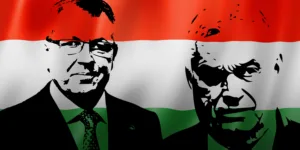It has been two days since the Sanctions Monday when the EU sanctioned four Chinese officials and one entity over alleged responsibility for human rights abuses in Xinjiang, and China reciprocated with sanctioning ten European individuals and four entities as they purportedly “severely harm China’s sovereignty and interests and maliciously spread lies and disinformation.”
Here we present for you some key takeaways. So grab your morning cup of joe and welcome to the special issue of the #CEEasia newsletter.
Do you need to know more about East Asia? Don’t hesitate to shoot us a message about custom analysis tailored to your needs.
Sanctions Monday: What’s in store for EU-China relations?
What’s going on? On Monday, the EU adopted sanctions against four Chinese officials and one entity over alleged responsibility for human rights abuses in Xinjiang against Uyghurs and other ethnic minorities. This was the first time the EU deployed sanctions against Chinese officials since the 1989 Tiananmen massacre. EU’s move was enabled by the recent adoption of the global human rights sanctions regime, which mimics the U.S. Magnitsky Act.
Naturally, China has reacted. However, instead of a tit-for-tat reaction, we have seen an asymmetrical response, both in the volume and breadth of the adopted countermeasures. China has sanctioned ten individuals and four entities. Unlike European sanctions, China’s target also European civil society and academia.
Who made the list? European sanctions targeted officials deemed responsible for the perpetuation of human rights abuses and the Xinjiang Production and Construction Corps Public Security Bureau which, per the sanctions decision, is a state-owned economic and paramilitary organization in Xinjiang that exercises administrative authority and controls economic activities in Xinjiang.
Chinese sanctions targeted five MEPs, three national-level MPs from the Netherlands, Belgium, and Lithuania. The sanctions also apply to the entire Subcommittee on Human Rights of the European Parliament (DROI) and the Political and Security Committee of the Council of the European Union (PSC) a key EU body for setting the common foreign and security policy, two individual researchers, and two NGOs/think tanks.
The inclusion of the DROI subcommittee and the PSC remains murky, as it is not yet clear whether all the members of the two bodies, including staffers, are sanctioned. Same goes for the two NGOs. It remains unclear whether the ambiguity is deliberate. Nevertheless, the ambiguity may motivate some putatively sanctioned individuals to self-censor to prevent the actual impact of the sanctions on them. This would ultimately benefit China.
EU’s sanctions list:
- Zhu Hailun | Former Deputy Head of the 13th People’s Congress of the Xinjiang Uyghur Autonomous Region (XUAR)
- Wang Junzheng | Party Secretary of the Xinjiang Production and Construction Corps, Deputy Secretary of the Party Committee of XUAR
- Wang Mingshan | Member of the Standing Committee of the Party Committee of XUAR, Secretary of the Political and Legal Affairs Committee of the XUAR
- Chen Mingguo | Director of the Xinjiang Public Security Bureau, Vice-Chairman of XUAR People’s Government
- Xinjiang Production and Construction Corps Public Security Bureau
China’s sanctions list:
- Reinhard Butikofer | MEP
- Michael Gahler | MEP
- Raphaël Glucksmann | MEP
- Ilhan Kyuchyuk | MEP
- Miriam Lexmann | MEP
- Sjoerd Wiemer Sjoerdsma | MP of the Dutch Parliament
- Samuel Cogolati | MP of the Belgian Federal Parliament
- Dovile Sakaliene | MP of the Seimas of the Republic of Lithuania
- Adrian Zenz | researcher
- Björn Jerdén | researcher
- Political and Security Committee of the Council of the European Union
- Subcommittee on Human Rights of the European Parliament
- Mercator Institute for China Studies | think tank
- Alliance of Democracies Foundation | NGO
Targeting independent research. Chinese sanctions differ significantly from the European ones as they target also non-governmental actors. Chinese move can be interpreted as an act of intimidation aimed at preventing open and critical discussion on issues China labels its ‘core interests’.
Today, directors of 32 European think tanks issued a joint statement in solidarity with the sanctioned researchers.
“We are deeply concerned that targeting independent researchers and civil society institutions undermines practical and constructive engagement by people who are striving to contribute positively to policy debates. This will be damaging not only for our ability to provide well-informed analysis but also for relations more broadly between China and Europe in the future.” Reads the key passage of the joint statement which was co-signed by CEIAS alongside a host of other think tanks.
What’s in store for EU-China relations? Sanctions against the explicitly mentioned MEPs (Reinhard Butikofer, Michael Gahler, Raphaël Glucksmann, Ilhan Kyuchyuk, and Miriam Lexmann) are noteworthy since they target representatives of the four largest fractions in the EU Parliament that collectively control around 70% of votes. Chinese sanctions may act as a catalyst for policy convergence in the EU Parliament, with China emerging as a subject on which there will be a consensus across the party lines. This will most likely impact the ratification of the Comprehensive Agreement on Investment between the EU and China, which already faced an uphill battle. S&D fraction already announced that its support for the deal is conditional on China lifting the sanctions against MEPs.
China’s problems will go deeper than the EU Parliament though. Recent public opinion polling by the Central European Institute of Asian Studies and the Sinophone Borderlands Project revealed that China is facing a public opinion crisis in the EU. From among the ten member states featured in the survey, all but one report a preponderance of negative views of China than positive ones. Large shares of the European population also report worsening views of China in the past three years, especially in Sweden and France where over half the population see China more negatively now than three years ago.
Perception of China among populations of select European countries







